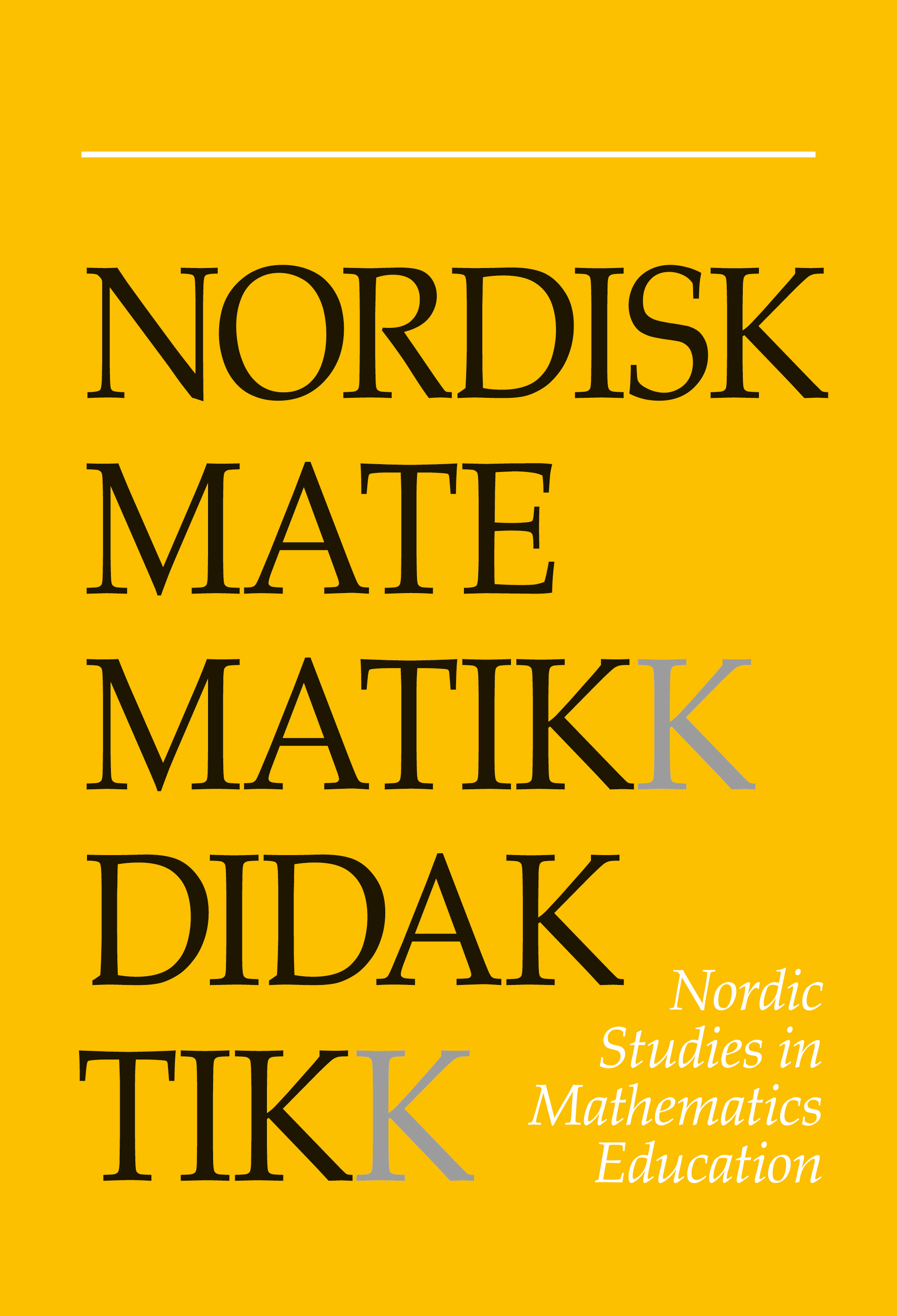Earlier mathematics achievement and success in university studies
DOI:
https://doi.org/10.7146/nomad.v9i4.147133Abstract
This study explores connections between earlier mathematics achievement in high school, success in university statistics and quantitative methods courses and experienced difficulties in quantitative methods courses. Earlier achievement in mathematics correlated with statistics grade in university studies, but not with quantitative methods course grade. Earlier achievement in mathematics was related to the experience of one’s own ability in mathematical subjects and quantitative methods, but it was not related to other experienced difficulties. Ability in mathematical subjects and quantitative methods was further connected to other difficulties experienced in quantitative methods. The experienced difficulties and achievement in university courses were not related.
References
Betz, N. E. (1978). Prevalence, distribution, and correlates of math anxiety in college students. Journal of Counseling Psychology 25, 441-448. https://doi.org/10.1037/0022-0167.25.5.441
Birenbaum, M., & Eylath, S. (1994). Who is afraid of statistics? Correlates of statistics anxiety among students of educational sciences. Educational Research 36, 93-98. https://doi.org/10.1080/0013188940360110
Clute, P. M. (1984). Mathematics anxiety, instructional method, and achievement in a survey course in college mathematics. Journal for Research in Mathematics Education 15, 50-58. https://doi.org/10.2307/748987
Filinson, R., & Niklas, D. (1992). The research critique approach to educating sociology students. Teaching Sociology 20, 129-134. https://doi.org/10.2307/1317396
Forte, J. (1995). Teaching statistics without sadistics. Journal of Social Work Education 31, 204-308. https://doi.org/10.1080/10437797.1995.10672258
Garfield, J., & Ahlgren, A. (1988). Difficulties in learning basic concepts in probability and statistics: Implications for research. Journal for Research in Mathematics Education 19(1), 44- 63. https://doi.org/10.5951/jresematheduc.19.1.0044
Hauff, H. M., & Fogarty, G. J. (1996). Analysing problem solving behaviour of successful and unsuccessful statistics students. Instructional Science 24, 397-409. https://doi.org/10.1007/BF00125577
Lehtinen, E., & Rui, E. (1995). Computer-supported complex learning: An environment for learning experimental methods and statistical inference. Machine-Mediated Learning 5(3&4), 149-175.
Murtonen, M., & Lehtinen, E. (2003). Difficulties experienced by education and sociology students in quantitative methods courses. Studies in Higher Education 28, 171-185. https://doi.org/10.1080/0307507032000058064
Murtonen, M. (2001, August). Conceptions of research methodology, consistency of conceptions and experienced difficulties on quantitative methods courses. Paper presented at the EARLI Biennial Meeting, Fribourg, Switzerland.
Newstead, K. (1998). Aspects of children's mathematics anxiety. Educational Studies in Mathematics 36, 53-71. https://doi.org/10.1023/A:1003177809664
Onwuegbuzie, A. J., & Daley, C. E. (1998, April). The relationship between learning styles and statistics anxiety in a research methodology course. Paper presented at the annual conference of the American Educational Research Association, San Diego, U.S.A.
Pretorius, T. B., & Norman, A. M. (1992). Psychometric data on the statistics anxiety scale for a sample of South African students. Educational & Psychological Measurement, 52, 933-937. https://doi.org/10.1177/0013164492052004015
Rosenthal, B. C., & Wilson, W. C. (1992). Student factors affecting performance in an MSW research and statistics course. Journal of Social Work Education 28, 77-85. https://doi.org/10.1080/10437797.1992.10778759
Resnick, H., Viehe, J., & Segal S. (1982). Is math anxiety a local phenomenon? A study of prevalence and dimensionality. Journal of Counseling Psychology 29, 39-47. https://doi.org/10.1037/0022-0167.29.1.39
Schoenfeld, A. H. (1989). Explorations of students' mathematical beliefs and behavior. Journal for Research in Mathematics Education 20, 338-355. https://doi.org/10.2307/749440
Thompson, B. W. (1994). Making data-analysis realistic: Incorporating research into statistics courses. Teaching of Psychology 21(1), 41-43. https://doi.org/10.1207/s15328023top2101_9
Townsend, M. A. R., Moore, D. W., Tuck, B. F., & Wilton, K. M. (1998). Self- concept and anxiety in university students studying social science statistics within a co-operative learning structure. Educational Psychology 18, 41-54. https://doi.org/10.1080/0144341980180103
Vosniadou, S. (1994). Capturing and modelling the process of conceptual change. Learning and Instruction 4, 45-69. https://doi.org/10.1016/0959-4752(94)90018-3
Zeidner, M. (1991). Statistics and mathematics anxiety in social science students: some interesting parallels. British Journal of Educational Psychology 61, 319-328. https://doi.org/10.1111/j.2044-8279.1991.tb00989.x
Downloads
Published
How to Cite
Issue
Section
License

This work is licensed under a Creative Commons Attribution-NonCommercial-ShareAlike 4.0 International License.



